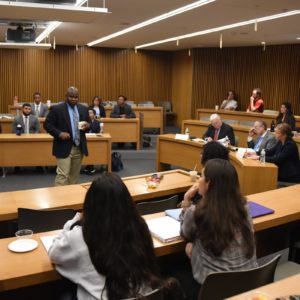
One of the challenges of college is assimilating large amounts of information from a variety of sources: lectures, course readings, independent work research, precept discussions, extracurricular programming—the list goes on and on. Compounding the challenge is the fact that what’s ultimately demanded of students is not mere recall, which can be accomplished through memorization. Rather, we’re charged with synthesizing disparate materials, pulling things together, making connections across genres of information. In this post, I reflect on some of the ways I try to do this.
In high school, many of my teachers required a separate binder or notebook for their course. In theory, I imagine such a policy aims to help students stay organized. Since this was the way I became used to taking and filing notes, I more or less kept doing it during my first year or two in college. But gradually, I left the one-class-one-binder approach behind in favor of taking all of my course notes in one three-subject notebook. So this semester, scribbles from my history seminar alternate with reading notes from my near eastern studies course. (I take all of my notes by hand, as a matter of personal preference, though I also feel that it facilitates more active engagement with and retention of what I’m writing when compared to typing.)
Besides minimizing the number of mostly-empty notebooks I’m lugging around in my backpack, I find the one-notebook approach useful for several academic reasons. Especially as an upper-class-year student, I find that my courses relate and overlap (by design, to some extent). So, if I want to compare elements of, say, classical Sufi mysticism and its medieval Christian mystical contemporaries, all my notes are in one place. And, when I hear something that might be useful for my thesis, I can flag it at the top of the page and easily skim through the notebook later to find it. (No stress about “Where did I write that down again?!”)
Moreover, note-taking in a single notebook gives me a chronological record of what I’ve been studying week to week, which is useful when writing a research paper (or a thesis!) that draws on coursework from multiple classes. Finally, changing the way I collect notes has also affected how I take them. It’s hard to quantify precisely, but I feel that the practice encourages me to think and make connections across disciplines more than I would if I treated each course as a self-contained unit. (For instance, I’ve come up with a personal shorthand, a way of codifying concepts, that I deploy across courses.)
As I’ve just related, centralizing information is one step I’ve taken toward synthesizing it. But this alone won’t do the trick. This is why I have a separate, smaller journal for developing my own thoughts, inspired by my course notes (and readings, etc.) yet creatively beyond them. Lecture notes are essentially a series of paraphrase quotations from the professor. My own notes are my thinking with that material in a more original way.
Freestyle note-taking is the crux of my personal information-synthesis program. When I have an idea, I go to my notebook, and—if I’m lucky—that first thought will set off a cascade of related others. This is where ideas germinate, and first-take arguments emerge. Papers end up being linear, written to be read left to right, top to bottom. But notes can be wonderfully abstract, as I can sketch out a concept-web of ideas linked with arrows and circles and stacks and the like. Maybe this is more of a personal thing, but I definitely find that writing “loose” notes like this can set the gears of the mind working in unexpected (and often intellectually fruitful) ways. If you haven’t tried this before, I’d suggest at least giving it a shot!
The task of attempting to master lots of material before combining it to produce original arguments is one of the most difficult yet ultimately rewarding challenges of college. Of course, it’s a very personal process as well, so by no means do I expect that my strategies will be optimal for everyone else. But, I hope that reading about my approach has helped you reflect on your own, and perhaps given you some new information to synthesize.
–Shanon FitzGerald, Humanities Correspondent

